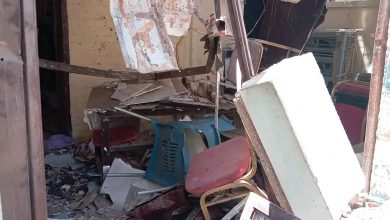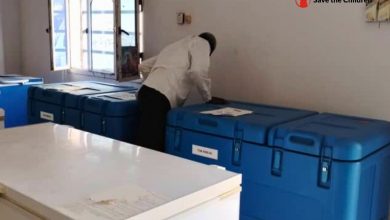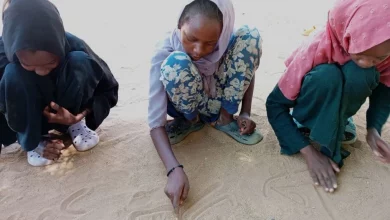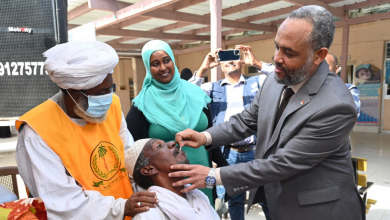“Three Seasons Without Harvest”: Agriculture in Al-Jazirah Collapses as Farmers Issue Distress Call
Sudanese Media Forum
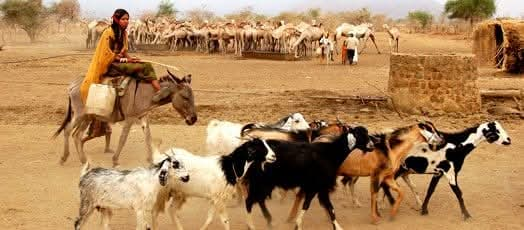
Ma’ab Al-Mirghani
Wad Madani, July 26, 2025 – (Jabraka News)
The agricultural sector in the Managil Extension Project in Al-Jazirah State is going through a critical phase that threatens its very survival amid the worsening impacts of the war and the collapse of infrastructure, compounded by a total absence of government and banking support.
Farmers expressed their deep frustration over skyrocketing input prices, the lack of financing, and the collapse of irrigation systems, all of which have led to a decline in production and a concerning reduction in cultivated land.
Forced Shift Away from Wheat
Mustafa, a farmer from eastern Al-Jazirah, expressed his disappointment at being forced to abandon wheat cultivation—on which he once relied—in favor of vegetables since the outbreak of war.
He explained that the shift was driven by the lack of fertilizers and seeds, and the absence of any official support, despite still struggling from failed past seasons.
“There are no accurate statistics on cultivated areas, whether for the winter or summer season, but they have declined significantly,” he told Jabraka News.
Mustafa emphasized that, despite the destruction, the Al-Jazirah Project is still capable of achieving high productivity that could meet the country’s needs if essential supplies were made available.
He appealed to authorities to urgently clear weeds from irrigation canals, provide pumps and fertilizers, and secure the necessary financing for land preparation so farmers could enter the new season fully prepared.
Collapsing Yields and Absentee Management
Omar Al-Ni’ma Arbab, a farmer from the Kuwait section of the Managil Extension Project, pointed to the collapse in productivity following the capture of Wad Madani by the Rapid Support Forces (RSF).
He noted that major crops—such as peanuts, sorghum, and wheat—once produced high yields: peanuts up to 30 sacks per feddan, and sorghum and wheat averaging 12 sacks per feddan.
“We used to receive seeds and fertilizers on credit, paying after the harvest, but this stopped after the RSF overran Wad Madani in late 2023. Even before that, supplies arrived late, affecting planting schedules and efficiency,” he said.
Arbab explained that soaring input prices and irregular water supply led to floods that destroyed crops, especially last year. Even though Wad Madani was retaken this year, preparation and planting remain painfully slow due to clogged canals, uncleaned irrigation ditches, and broken channels threatening farmland with flooding.
Seed and fertilizer prices have soared beyond the reach of small-scale farmers, and while fuel is available, machinery—especially excavators and canal-cleaning equipment—remains scarce or unaffordable.
“The agricultural administration is either absent or willfully blind,” Arbab lamented, adding that many farmers have abandoned farming altogether, either leasing their land or leaving it fallow.
Still, Arbab expressed cautious optimism, saying hope remains if the will exists. He urged immediate repairs to broken canals, the provision of seeds and fertilizers for the winter season, and a rapid start before the rainy season. He also noted the complete absence of any meaningful role by farmers’ unions, such as the Al-Jazirah and Managil Farmers’ Alliance.
Three Seasons Without Harvest
Former farmer Hussein Saad, a member of the Al-Jazirah and Managil Farmers’ Alliance, shed further light on the depth of the crisis, noting that conditions were far better in peacetime.
“Before the war, a sack of fertilizer cost no more than SDG 20,000, but now it has jumped to SDG 120,000. Preparing one feddan with tractors used to cost under SDG 10,000; today it’s closer to SDG 30,000,” he told Jabraka News.
He recalled that in previous years, the summer crop covered over 500,000 feddans, with 250,000–300,000 feddans in the winter season. Today, the summer crop is unlikely to exceed 150,000 feddans.
Hussein pointed to the last successful season during the transitional government (August 2019 – October 2021), when farmers produced a bumper wheat harvest and symbolically gifted it to the Agricultural Bank in support of the new era. At that time, the bank actively financed farmers and provided needed facilities.
“Now everything has changed,” he said. “The bank no longer offers support, especially in the northern part of the project, where the facilities were looted in Kamlin, Maileq, and Ab Ashar. Sorghum and salt stocks allocated for farmers were stolen, and financing stopped entirely.”
Hussein added: “I couldn’t cultivate my land this year due to water shortages, and we are now facing our third season since the war began without a harvest.” He pointed to the absence or prohibitive cost of seeds and fertilizers, coupled with the overwhelming expense of land preparation, which has driven many farmers out of agriculture.
Security Extortion and Legislative Decay
Hussein reported that farmers have faced direct extortion, with RSF forces demanding SDG 60,000 as “harvest fees” and imposing fines of up to SDG 1.75 million on some of his relatives.
He described the complete destruction and looting of the Maileq agricultural office and stressed that policies from the previous regime had already undermined farmers’ roles, even leading to the imprisonment of some.
He explained that earlier administrative changes transferred irrigation authority away from its original management, causing major issues in the canal system and contributing to the collapse of productivity, seed, and pesticide systems.
Hussein said the Farmers’ Alliance has repeatedly issued statements warning authorities of the disaster’s scale, but with little response. Many farmers have abandoned agriculture due to the crushing costs, turning instead to alternative livelihoods.
He emphasized that it is unrealistic to expect successful cultivation under current wartime conditions. However, he insisted that local and international organizations must directly support farmers through emergency committees, bypassing the government, as this is the only way to restore production.
An Uncertain Future
Farouq Al-Badawi, a member of the secretariat of the Al-Jazirah and Managil Farmers’ Alliance, described the alarming deterioration in the project’s agricultural situation due to the war and misguided pre-war economic policies.
He said that before the war, the project’s agriculture was operating at 100% capacity, but this dropped to about 45% after the war began, especially in areas under RSF control that lack financing and security.
He recalled the last successful season (2019–2020), during Prime Minister Abdalla Hamdok’s transitional government, when 500,000 feddans of wheat were cultivated with Agricultural Bank funding, yielding an average of 17 sacks per feddan, with some fields recording record-breaking yields of 35 sacks.
But in subsequent seasons, production collapsed due to what he described as “anti-farmer policies” from the Ministry of Finance under Minister Jibril Ibrahim, including the rollback of guaranteed pricing and irregular agricultural financing, leaving thousands of farmers heavily indebted to the Agricultural Bank.
With the war, farmers have lost four consecutive seasons, as the state has failed to provide dredgers to clear irrigation canals and repair war damage. Water delivery to vast areas of the project remains delayed despite promises from the irrigation authority.
Farouq noted that soaring costs have become unmanageable for exhausted farmers: “Preparing a single feddan now costs SDG 150,000; a sack of urea is SDG 100,000, and DAP exceeds SDG 120,000. Meanwhile, farmers have lost equipment to looting.”
He stressed that the lack of financing and delays in the official planting schedule set by agricultural research further jeopardize this year’s crop.
The Sudanese Media Forum and its member institutions are publishing this report by Jabraka News to highlight the grim reality faced by agriculture and the farming community in the Al-Jazirah Project, where skyrocketing input prices, the absence of financing, and the collapse of irrigation systems have led to severe declines in production and a worrying reduction in cultivated land.

